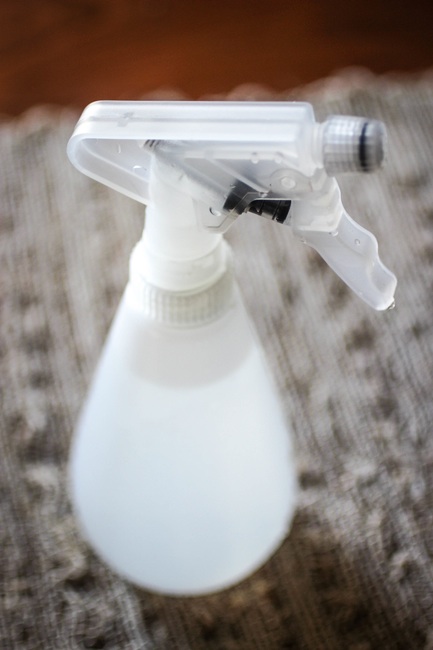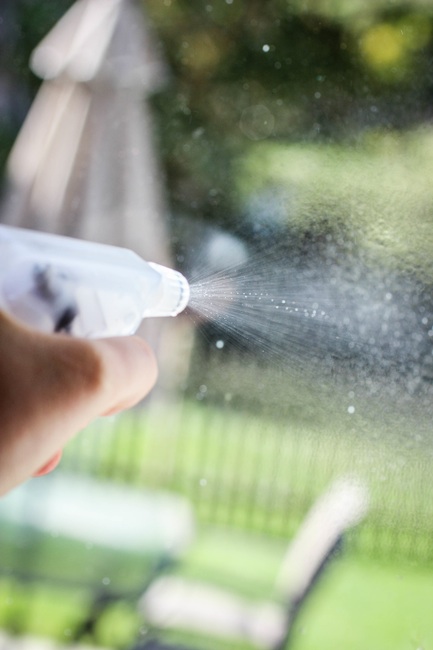Reading the labels on household cleaners is just plain scary. “Toxic. May cause severe burns to skin, eyes and mucous membranes. Harmful if swallowed. Can irritate airways. May aggravate asthma and allergies. Wear safety glasses and rubber gloves when using.” Although these phrases are usually typed in an itsy-bitsy font on the very back of the bottle, warnings about the dangers of chemical cleaning products should definitely not be ignored. Consider swapping out store bought cleaners in your home for simpler DIY versions like this all-purpose spray with just 3 ingredients. Homemade cleaners are safer, healthier and way less expensive. Plus, I don’t know about you, but if I can avoid wearing a pair of goggles and a protective suit to keep myself safe every time I scrub the shower, I'm all for it.

In summary, here are my top 5 reasons (there are many more) for skipping out on storebought cleaning products
- Contain toxic chemicals
- May increase risk cancer, asthma and other serious conditions
- Many have been banned in other countries due to safety concerns
- Unregulated, deceitful labels and ingredient lists make choices impossible
- Marketing and claims of being "non-toxic," "safe" are often false
The All-Natural Cleaning Secret: Vinegar
If you want to ditch commercial cleaners but aren't sure where to start, I've got an answer for you: vinegar. Plain old household vinegar is one of the most popular and time-tested partners for household chores. Bought by the jug-full, it can be used for cooking, crafting and so much more. As one of the simplest all-purpose cleaners out there, vinegar is also the very ingredient that will revolutionize the way you spiffy-up your house.
So how does vinegar work as a cleaner anyway? Is all of the folklore actually true? In short: yes! The low pH and acetic acid content of vinegar loosen up dirt and grease, while also deodorizing and preventing the growth of microorganisms. Several studies have even demonstrated the ability of vinegar to deactivate viruses and pathogenic bacteria. This quality, especially when combined with the help of antiseptic essential oils, is especially important for leaving the house squeaky-clean, and you and your family sickness- and worry-free.
The spray that I use for most light cleaning work is a simple blend of vinegar, water and essential oils. If you want to add some pizazz to your routine, you can also add a dash of baking soda to surfaces prior to cleaning, and then spritz with the vinegar spray. Remember those baking soda-vinegar volcano experiments from grade school? Well, that very same foaming action can be applied to cut through tough grime, dissolve soap scum and work on pesky mineral deposits.

Guide to Bacteria-Fighting Essential Oils
The second key component of my favorite all-purpose cleaning spray is a antibacterial essential oil blend. Certain essential oils have shown tremendous power for warding off pathogens in scientific studies, some with even greater success rates than high intensity chemicals. Below is a list of some common and safe essential oils to use in cleaning products. Keep in mind that each has a specific set of attributes and target group of pathogens, that make it unique and valuable. As you get more comfortable with making and using DIY cleaners, you can experiment with essential oil combinations that will tackle particular cleaning jobs and attack specific infecting agents. There are many studies (such as the sampling listed at the very bottom of this page) testing the efficacy of essential oils on a variety of common pathogens. This research can be helpful in getting into the nitty-gritty science of making customized cleaning formulas. To start however, I recommend a general combination of any of the following:
Lavender-Relaxing and cleaning all in one! As an antiseptic, antiviral, bactericidal, and fungicidal, this popular essential oil will leave your house spotless and smelling great too.
Lemongrass-So powerful, this essential oil has been found to fight off even the toughest multidrug-resistant organisms! Lemon is also great at cutting through grease, making it very helpful in the kitchen.
Oregano- Tested against a list of 111 bacteria species, oregano oil proved its incredible antibacterial abilities. Interestingly, some people have even used the oil internally as an antibiotic alternative- although that's a post for another day.
Sweet Orange-An antiseptic with antifungal and antibacterial properties, orange has that tell-tale citrus quality of being an effective degreaser.
Tea Tree- As an antimicrobial, antifungal, antiseptic, bactericidal, and insecticidal, this oil combines well with others to make a truly versatile cleaner. Use it in those tough areas like the kitchen sink and bathroom.

DIY All-Purpose Cleaner
By Kayla- Radiant LifeIngredients
1 cup water
1 cup white or apple cider vinegar
essential oil blend (20-40 drops)
In a spray bottle, combine equal parts warm water and vinegar. Add 10-20 drops essential oil(s) of choice. Replace the cap, and shake generously. Use as you would any other all-purpose cleaner for wood, glass, stainless steel and porcelain. Wipe with a microfiber cloth or paper towel. If you are unsure of a particular surface, test on a small area first.

Additional Reading
Resources to check out:
Environmental Working Group Database
Design for the Environment EPA
Other Cleaners to Try
DIY Non-Toxic Cleaning Supplies Mommypotamus
Natural Cleaning Tips Wellness Mama
Household Cleaners DIY Naturals
